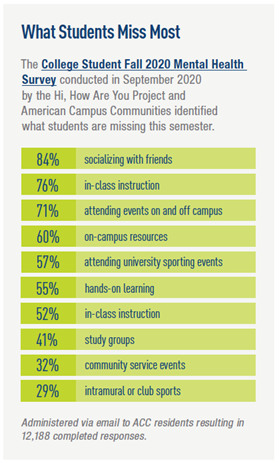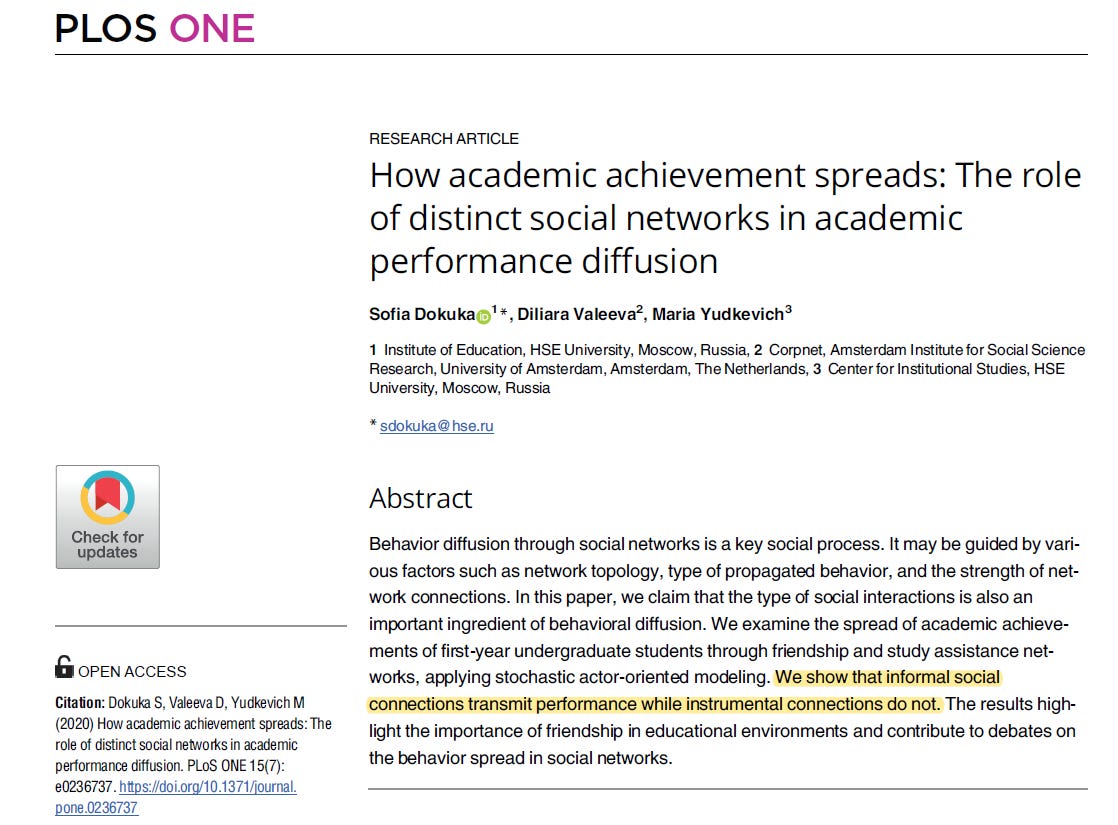Campus is Good for Learning, Even if Classes Are Online
New research shows how social networks boost academic attainment
The 2020 pandemic led to nation-wide university shutdowns and an abrupt shift to online learning. Aside from the technological changes that naturally come with online instruction, online learning at scale produces a unique problem of its own: social isolation.
Humans are social learners – in fact, we excel at it. We have evolved to be a highly cooperative, social species with brains that are built to learn. But online learning characterized by staring at a screen and working your way through clogged course pages and asynchronous activities is not the ideal environment for our natural learning instincts to thrive – the social aspect to learning is fundamental.
So, after a semester (plus half) of online courses, what do we know about how the transition to online education at scale affected the student learning experience? If I am being honest, not much in my opinion. I haven’t come across robust large-N data on academic outcomes over the pandemic semester (please, send me sources if you have them), but if K12 is any indication, higher ed students are likely learning less, too.
There are numerous reasons for this, including the important fact that most professors have little to no training in teaching online (or teaching in-person for that matter). Many students also have no prior experience taking online courses, and a substantial minority of students are experiencing problems of technology access.
The research that is coming out on the effects of the pandemic semester are largely survey results from organizations, rather than universities. What do these surveys show? A few notable highlights:
77% of students report online learning to be much harder than in person learning.
58% of students are struggling to keep up academically.
58% of students report that feeling lonely or isolated has been challenging during the fall semester.
84% of students report that socializing with friends is what they missed most about college.
76% of students (or maybe 52% according to the below figure) miss in-class instruction.
71% of students miss attending events on and off campus.
A trend that these findings have in common is that students are missing the social aspects of the college experience – being in the classroom, hands-on learning, dorm and group living, socializing with friends, going to campus events, etc. Without these social experiences, students are also reporting that keeping up on academics is harder and that the learning experience is more difficult, too.
If we assume courses online and in-person to be equivalent (which we shouldn’t, but let’s assume), why might campus socializing be beneficial to students, both personally and academically?
A new study published in PLoS One evaluated the role of friendship networks and study support networks on university students’ GPA (data from 2013-14 academic year). The authors asked students to identify both informal friendship circles (those they spend the most time with) and study assistance networks (those they ask for help the most on academics) to evaluate how academic achievement spreads though these networks. Put differently, how do social networks impact university GPA.
Although one might initially think that social networks built explicitly around academics may have greater impacts on academic performance, the authors actually found that friendship networks were more impactful for explaining how academic achievement spreads.
Academic performance of students tends to become similar to the performance of their friends. In other words, academic achievements diffuse through friendship ties. . . [however] the effect of social selection in the friendship network is not significant. This means that students do not have a preference to befriend students with similar academic achievements.
This research builds on other studies that have investigated the role of social networks – and specifically who students spend their time with – on academic outcomes. Previous studies have shown how random assignment of roommates in college dorms impacts GPA of university freshmen. And, cohort models of learning, like those often found in medical programs, tend to have positive impacts on learning.
Some universities are applying social network research to enact new policies. Recently, for example, Michigan State University has announced a new housing requirement aimed at sophomores in which they will now be required to live on campus during their second year. The university cites their institutional research showing that graduation rates for campus-living students is higher, especially during their second year. In theory, this is a good idea given what we know about social networks and academic achievement (though understandably students and alumni of Michigan State are citing this new policy as a “money grab” for the university).
Humans are built to learn, and specifically to learn socially. Isolation from social networks, which are strongly tied to academic communities and college campuses, may be having a negative impact on the spread of complex behaviors related to educational achievement, such as studying. The reports that are surfacing of students finding it difficult to focus on their academic work and lacking motivation may be related, in part, to being removed from their social networks.
Online education has been prominent in the higher ed landscape for quite some time, but comparing the outcomes of those that select into traditional or online learning environments is not a helpful comparison because of the selection bias of those students. The pandemic, however, has created a natural experiment in which to study how abrupt and involuntary severing of social networks and learning communities are impacting student outcomes. Focused research on this topic as a result of the pandemic is an area that educational research shouldn’t overlook.
This post contains affiliate links, allowing me to earn a small commission when you purchase books from the link provided. There is no cost to you, and this will allow me to keep this newsletter free and open to all. Happy reading!







